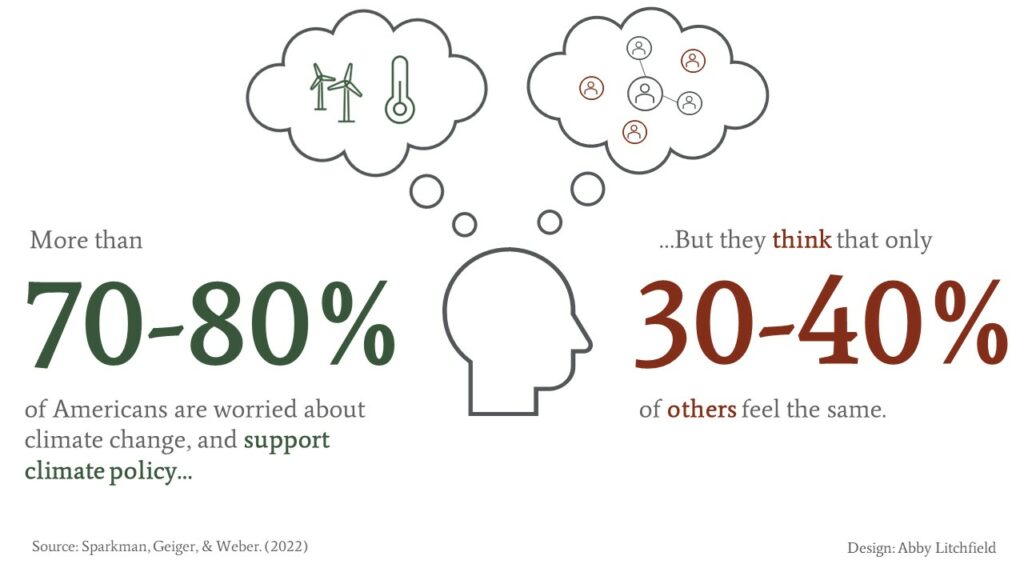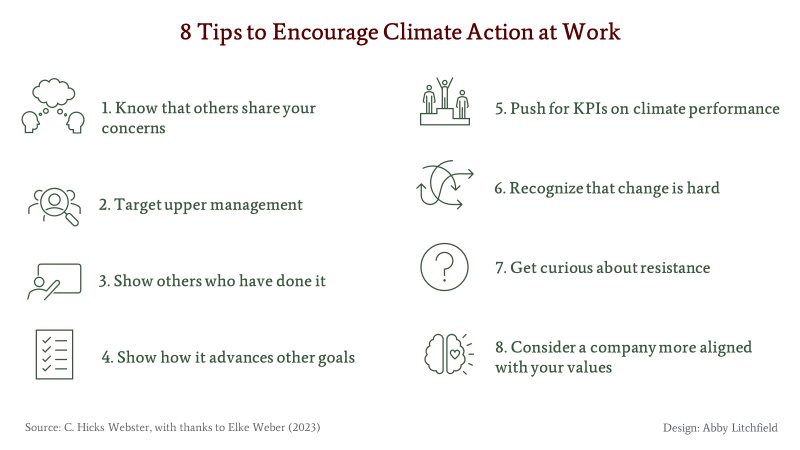Who to talk to and what to say to motivate climate action at work.
Think your company could do more to tackle climate change? Perhaps you see opportunities to swap dated technology for something more energy efficient. Or maybe you see options for more energy-efficient trucking and logistics.
Speaking up can be scary. You might wonder what to say. Or whom to say it to. Or what to do if they don’t like your ideas.
That’s why the Network for Business Sustainability (NBS) and Climate Now partnered to create a podcast called How to Talk About Climate Change.
We spoke with three experts who understand how people make decisions about climate change.
- Professor Elke Weber, a psychologist at Princeton University, studies the decision-making processes that shape people’s responses to environmental change and policy.
- David Fenton, founder of Fenton Communications, has been an activist for over 50 years. He’s an expert in using public relations, social media, and advertising techniques to advance social change.
- Leah Thomas, founder of Intersectional Environmentalist, uses writing and creativity to advocate for the relationship between social justice and environmentalism.
Climate Now synthesized these interviews into a single podcast called “How to Talk about Climate Change” (click here to listen).
NBS is going deeper on these critical conversations by focusing on two themes in the podcast.
In this article, we talk about encouraging climate action at work. Elke Weber describes whom to prioritize in your organization, what to say to them, and what to do if your ideas get pushback.
A sister article offers broader communication advice for activists, with a focus on insights from Thomas and Fenton.
Now, let’s turn to the workplace. Here’s Weber’s advice.
Know that Others Share Your Concerns
Often, we don’t talk about climate action because we don’t think others share our views. We worry our ideas might be criticized or perceived as radical.
According to Weber, it might be safer than you think. She says:
We asked a large representative sample of Americans about their support for different climate policies [like a cost on carbon] and their worry about climate change. Seventy to 80% of Americans across the political spectrum were worried about climate change and were supportive of these policies. But they thought that only 30 to 40% of other Americans [felt the same].
As a result, they won’t talk about their [support for climate action]. They’re afraid they’re going to be challenged on it. That creates a spiral of silence. They don’t talk about it, so they don’t find out that others also support it.
So, step 1? Break the spiral of silence. Be willing to talk about climate action at work. You’ll probably find more support than you think.
Target Upper Management
Change-making at work involves a paradox. You’ll feel most comfortable talking to your peers, but they lack decision-making power. The people whose buy-in you really need are probably a few paygrades above you.
Weber encourages mustering the courage to talk to management.
If your company has a Sustainability Officer, take them out to lunch to get feedback on your ideas. Or use larger company events, like a holiday party or offsite function, to talk to upper management in an informal setting.
There’s no exact formula to determine which leaders to reach out to. Ask around to find out who has the decision-making power to put your ideas into action, and who may already be sympathetic to your cause. Connecting productively with upper management may also involve long-term relationship building, as a group of employee activists learned when pushing for LGBTQ rights at work.
Show Others Who Have Made these Changes
Did you know the best predictor of whether someone will install a solar panel at home is whether their neighbours have solar panels? Your manager will have similar tendencies. They will probably be motivated by what other companies are doing and whether it’s working.
Weber suggests looking for case studies of other companies’ efforts, and sharing their outcomes.
Let’s say you work at an oil company and you want to propose a change to the company’s incentive system [to encourage energy efficiency]. Provide upper management with data about the extent to which the new incentive system has been implemented by competitors. Have those data at hand and show how the change has been useful.
(Speaking of looking to leaders: Weber and her colleagues at Princeton recently launched a survey to identify global leaders and laggards in the net zero transition. If you’re involved in clean energy projects, they’d be grateful if you spent 5-15 minutes sharing your experience!)
Show How Action Advances Other Goals
While your goal in speaking up might be to lower greenhouse gas emissions, it can help your case to show how your suggested changes will have other positive impacts (“co-benefits”).
Weber says: I argue [using] benefits and co-benefits. Those are underappreciated with climate action. Oftentimes, [action is] not just better for the climate, it also has many, many other co-benefits. Show people that it makes their life easier.
Maybe [a new procurement system] has a smart default in place. When you have to order a new light bulb or a new engine, it automatically generates the most energy-efficient and cost-effective item. I think demonstrating the effort saved would go a long way to getting people interested.
Push for KPIs on Climate Performance
If you’re able to influence your company’s key performance indicators (KPIs), push to include climate action. When employees are rewarded for climate innovation (or punished for missing climate goals), their behaviour changes.
Key performance indicators make sure that whatever climate action a company values is communicated not just verbally, to your employees. That means having carrots or sticks. Give positive reinforcement to those who are most innovative in that space. Give them the promotions and the salary increases. Publicize why they’re being rewarded. Negative reinforcement works as well. Unless there’s some external stimulus that says we must change, we are not gonna do it.
Carbon reporting is one way to embed climate-related KPIs into your organization’s strategic processes. Organizations like CDP offer clear reporting frameworks to help company’s measure and report on greenhouse gas emissions. Research shows that reporting helps companies reduce emissions – but also spurs innovation, saves money, and helps companies prepare for the future (co-benefits!).
Recognize that Change Is Hard
We all know that change is challenging. Even if you deliver your message seamlessly and your manager likes your ideas, the change process will still be rocky. There are a few reasons why.
Old Habits Die Hard
Weber explains: People do things, oftentimes for a very good reason. Then, when the environment changes, they have a hard time doing things differently. For example, [energy consumption] habits were formed in a time period when energy was not an issue. It seemed unlimited. It was pretty cheap.
Even though we know the consequence of not changing will be high, it’s still hard to act.
She shared a light-hearted parallel: I don’t like to update my computer software, even though I know it’s gonna solve all these problems, like security issues. But it’s also gonna look a little different. And it’s just annoying when things don’t look the same way they did. That’s effortful.
Change Can Threaten Identity
Sometimes the barrier to change goes beyond habits. Actions may be core to someone’s identity. Change then feels like a threat to who they are.
Our identity is shaped by what we have been doing all of our lives. It’s not easy to just switch gears. I come from a region in Germany where coal mines drove the economy. You saw the mine shafts every day, and it’s a lifestyle. Just because mining jobs are not particularly pleasant and safe, doesn’t mean that people don’t think about themselves as miners. You have to respect that. Just because the economy and our awareness of ecology have changed, that doesn’t invalidate people’s perceptions of who they are.
You won’t change a person from a miner to a renewable energy worker in a weekend, or even in a couple of years. Often, these changes of identity take a generation. The younger generation gets trained for different types of jobs. With climate action, we don’t have that time to wait. But maybe we will have to wait that long.
Get Curious about Resistance
I’m a sustainability writer, but I’m also a life coach. I couldn’t help but chuckle when Weber described the things that make it so darn hard to motivate people to climate action. They are the same barriers people face when trying to change their partner, their kids, or their parents. And it’s not because those people are flawed.
Think about the last time you tried to change your own life – maybe going vegetarian, or exercising regularly. I bet the journey was bumpy, even though it was something you wanted.
Your boss and co-workers will be the same. They may take pride in how they’re doing their job now. Maybe they’re worried about failing, or not meeting their own performance requirements. These experiences are real and need to be heard to be overcome.
My advice? Expect resistance and try to understand its source. Validate concerns and help people find solutions for their fears. It might seem backward, but holding space for people to explore their own resistance is usually the fastest path to helping them move forward.
Consider a Company More Aligned with Your Values
At the end of the day, if you just can’t spark change, Weber suggests considering a new job. That can be hard, but options are expanding.
Go to the competition. That’s a big way to motivate companies to take action. Everybody wants to keep their employees. The new generation of employees wants to work for companies that share their values. Point out to higher-ups that they’re losing people because of their lack of climate action.
About Climate Now
Climate Now is a multimedia content platform that produces weekly podcasts, videos, and live events focused on accelerating society’s progress towards a net-zero-emissions future by educating and connecting key stakeholders and leaders across sectors. Climate Now, via its sister company Blue Engine Strategies, also performs technical analysis and advisory services for municipalities and counties seeking to implement sustainable economic development, emissions reduction, and climate action plans.
More About Elke Weber
Elke Weber, a behavioral scientist, holds joint appointments at Princeton University in the Andlinger Center for Energy and the Environment, the Princeton School of Public and International Affairs (SPIA), and the Department of Psychology.
She founded and directs the Behavioral Science for Policy Lab. Her world-renowned career in behavioral decision science spans measuring and modeling behaviors of individuals and groups as they deal with uncertainty and trade-offs in business decisions, as well as examining how choices impact the environment and their implications for environmental and energy policy. Weber’s research intersects psychology, economics, environment, and policymaking.
What Do You Think?
NBS survey respondents saw sustainable innovation as the top sustainability priority of 2023 (22% of respondents). What is your top sustainability priority for action this year?
Share your thoughts in the comments below.





Add a Comment
This site uses User Verification plugin to reduce spam. See how your comment data is processed.This site uses User Verification plugin to reduce spam. See how your comment data is processed.